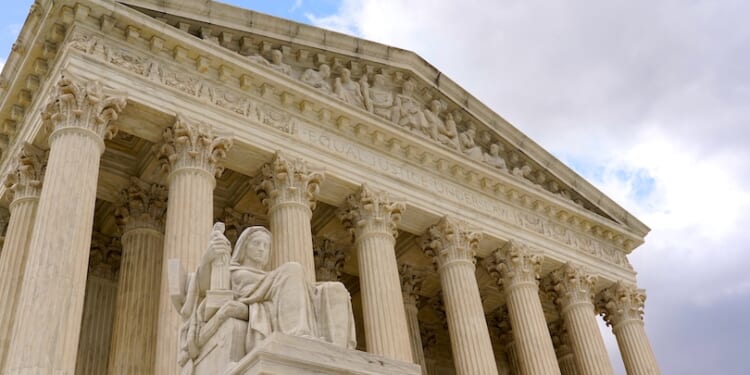(LifeSiteNews) — The United States Conference of Catholic Bishops (USCCB) joined with more than 50 other groups in calling on the Supreme Court to protect female sports from being taken over by gender-confused males who say they are now women.
The Supreme Court will decide two related cases this upcoming term – one involves a gender-confused male who wished to compete on the Boise State University women’s cross-country and track teams in violation of Idaho’s law on “transgender” athletes. Another considers a similar prohibition in West Virginia. This case involves a gender-confused male middle schooler who competes in track and field events against girls. The cases are Little v. Hecox and West Virginia v. B.P.J and both are being argued by the ACLU.
The bishops’ conference also says that there are religious liberty issues at play, as a ruling in favor of “transgender” athletes would force Catholic schools to allow gender-confused males to play on female sports teams. This would necessarily require the schools to “communicate a message at odds with Catholic doctrine.”
Challengers, led by the left-wing ACLU, argue that such laws violate the Equal Protection Clause of the U.S. Constitution as well as Title IX, a federal law that ensures female students have the same educational and extracurricular opportunities as male students.
But the challenge from LGBT activists should fail, the USCCB says, because federal law clearly protects sex-segregated sports due to biological differences.
READ: USCCB remains silent on Charlie Kirk in contrast to effusive response after George Floyd’s death
“These differences are especially apparent in athletics; males are generally larger, faster, stronger, and more aggressive,” the brief argues. “Yet both sexes benefit from athletic competition, especially as children; sports are among the most effective tools for instilling discipline, self-sacrifice, and work ethic.”
The segregation of sports teams by sex ensures “girls and women can safely and fairly compete in sports.”
Importantly, neither law forbids “transgender” athletes from sports in entirety. Rather, they prevent all males from competing in girls’ sports.
Idaho’s law does not prohibit females who “identify” as men from competing on male sports teams. This is because women are physically weaker than men. However, Idaho could have passed such a prohibition, the USCCB states.
“Idaho’s law simply ensures that the rare female athlete able to safely and fairly compete with boys and men can do so,” the brief states. “It cannot be that Idaho’s sex-based classification fails only because Idaho did not segregate the sexes as much as it could have.”
Gender ideology violates core Catholic teaching
The brief also states that a ruling for the “transgender” athletes would force Catholic schools to accept an ideology at odds with core Catholic teaching on human nature.
“Gender ideology contradicts these teachings,” the filing states. “In gender ideology, human sexual identity is socially constructed and ‘dependent upon the subjective mindset of each person, who can choose a gender not corresponding to his or her biological sex, and therefore with the way others see that person (transgenderism),’” the bishops’ conference said, citing the Congregation for Catholic Education.
The brief concludes by laying out the sources of funding that Catholic schools would lose if forced to comply with the ruling. It also makes the point that while schools could still teach the truth about sex, forcing them to accept gender-confused males on women’s teams would undermine their teaching, writing “what students see is often more powerful than what they hear.”
“Allowing males to compete as girls and women on female-only teams imparts a false view of reality, in
which sex can be rejected or altered to suit individual preference,” the USCCB states. “That message contravenes Catholic teaching. So, Catholic schools cannot assist in promoting that message.”
The brief adds to a number of other filings with the Supreme Court that support Idaho and West Virginia’s laws. Medical experts, for example, also argued in support of the prohibitions, as recently reported by LifeSiteNews.
Legal scholars and female athletes are also asking the Supreme Court to protect women’s sports.

















